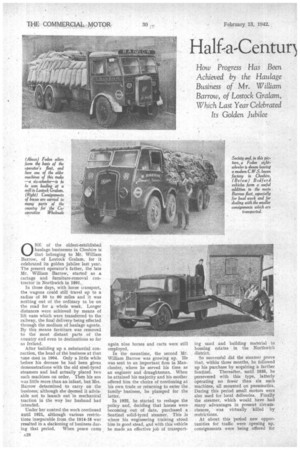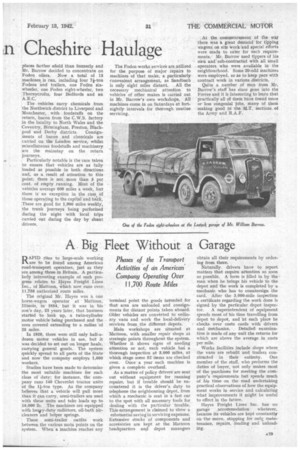Halfa-Centur) n Cheshire Haulage
Page 30

Page 31

If you've noticed an error in this article please click here to report it so we can fix it.
How Progress Has Been Achieved by the Haulage Business of Mr. William Barrow, of Lostock Gralam, Which Last Year Celebrated
Its Golden Jubilee
ONE of the oldest-established haulage businesses in Cheshire is that belonging to Mr. William Barrow, of Lostock Gralam, for it celebrated its golden jubilee last year. The present operator's father, the late Mr. William Barrow, started as a cartage and furniture-removal contractor in Northwich in 1891.,
In those days, with horse transport, tho wagons could still travel up to a radius of 50 to 60 miles and it was nothing out of the ordinary to be on the road for a whole week. Longer distances were achieved by means of lift vans which were transferred to the railway, the final delivery being effected through the medium of haulage agents. By this means furniture was removed to the most distant parts of the country and even to destinations solar as Ireland.
After building up a substantial connection, the head of the business at that time died in 1904. Only a little while before his decease he had been given demonstrations with the old steel-tyred steamers and' had actually placed two such machines on order, Then his son was little more, than an infant, but Mrs. Barrow determined to carry on the business, although she deemed it advisable not to launch out in mechanical traction in the way her husband had intended.
Under her control the work continued until 1921., although various restrictions inseparable from the 1914-18 war -resulted in a slackening of business during that period. When peace came
again nine horses and carts were still employed.
In the meantime, the second Mr. William Barrow was growing up. He was sent to an important firm in Manchester, where he served his time as an engineer and draughtsman. When he attained his majority and his mother offered him the choice of 'continuing at his own trade or returning to enter the `family. business, he plumped for the latter.
In 1922, he started to reshape the policy and, deciding that horses were becoming out of date, purchased a Sentinel solid-tyred steamer. This is where his engineering training stood him in good stead, and with this vehicle he made an effective job of transport
ing sand and building material to housing estates in the Northwich district.
So successful did the steamer prove that, within three months, he followed up his purchase by acquiring a further Sentinel. Thereafter, until 1935, he persevered with this type, latterly operating no fewer than six such machines, all mounted on pneumatics. During this period small motors were also used for local deliveries.. Finally the steamer, which would have had many advantages in present circumstances, was virtually killed by restrictions..
At about this period new opportunities for traffic were opening up, consignments were being offered for places farther afield than formerly and Mr. Barrow decided to concentrate on Foden oilers. Now a total of 19 machines, is run, including four 7i-ton Fodens and trailers, one Foden sixwheeler, one Foden eight-wheeler, two Thornycrefts, four Bedfords and au AE .C.
The vehicles carry chemicals from the Northwich district to Liverpool and Manchester. with. foodstuffs on the return, bacon from the C.W.S. factory in the locality to North Wales and the Coventry, Birmingham, Preston, Black
pool and Derby districts, Consignments of bacon and chemicals are carried on the London service, whilst miscellaneous foodstuffs and machinery are the mainstay on the return journeys.
Particularly notable is the care taken to ensure that vehicles are as fully loaded as possible in both directions and, as a result of attention to this point; there is not more than 5 per cent, of empty running. Most of the vehicles average 600 miles a week, but there is an exception in the case, of those operating to the capital and hack. .These are good for 1,000 miles weekly. the trunk journeys being performed during the night with local trips carried ont during the day by shunt drivers.
The Foden works service's are utilized for the purpose of major repairs to machines of that make, a particularly convenient arrangement, as Sandbach is only eight miles distant. All the necessary mechanical attention to vehicles of other makes is carried out in Mr. Barrow's own workshops. All machines come in on Saturdays at fortnightly intervals for thorough routine servicing.
• ..At the commencement of the war there was a great demand fbr tipping wagons', on site work and special efforts were made to cater for such requirements. Mr. Barrow used tippers of his own and sub-contracted with all small operators who were available in the neighbourhood. Some 20-odd machines were employed, so as to keep pace with contract work in various .districts.
Quite a number of men from Mr, Barrow's staff has since goneinto the Forces and it is interesting to learn that practically all of them have found more or less congenial jobs, many of them making good Id the• ALT. sections. of the Army and It.A.F.




















































